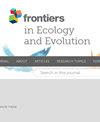前沿 | 美国华盛顿州埃尔瓦河上的两座大坝拆除后,大鳞大麻哈鱼(Oncorhynchus tshawytscha)和钢鳞鲑(Oncorhynchus mykiss)的初步反应
IF 2.4
3区 环境科学与生态学
Q2 ECOLOGY
引用次数: 0
摘要
大型水坝的拆除被用于恢复河流系统,但对其结果仍存在疑问。我们研究了埃尔瓦河两座大型水坝的拆除,以及孵化生产和禁渔如何影响大鳞大麻哈鱼(Oncorhynchus tshawytscha)和钢鳞大麻哈鱼(O. mykiss)的种群属性。回归的成年大鳞大麻哈鱼和钢鳞大麻哈鱼的最初反应是,天然鱼类和孵化鱼类的数量和空间范围有所增加。虽然在大坝拆除之前和拆除期间,几乎没有观察到自然生产的大鳞马哈鱼和钢鳞鲑幼鱼出游,但在成鱼通道恢复三年后,数量有所增加,这表明大坝拆除后下游沉积物造成的影响有所减少。大鳞大麻哈鱼种群的人口结构仍以孵化生产为主,而冬季钢鳞鲑数量的增加包括孵化和自然产卵。冬季钢镞在前水坝所在地上游的空间扩张主要是由自然产卵者造成的。我们还观察到夏季钢镞的自然 "苏醒",这些钢镞部分来自返回上艾尔瓦河的上游居民种群。我们的研究结果表明,将栖息地、孵化和捕捞行动结合起来,可以对鲑鱼种群产生积极的影响。本文章由计算机程序翻译,如有差异,请以英文原文为准。
Frontiers | Initial responses of Chinook salmon (Oncorhynchus tshawytscha) and steelhead (Oncorhynchus mykiss) to removal of two dams on the Elwha River, Washington State, U.S.A
Large dam removal is being used to restore river systems, but questions remain regarding their outcomes. We examine how the removal of two large dams in the Elwha River, coupled with hatchery production and fishing closures, affected population attributes of Chinook salmon (Oncorhynchus tshawytscha) and steelhead (O. mykiss). Initial responses by returning adult Chinook salmon and steelhead was an increase in the number and spatial extent of natural and hatchery origin fish. Although few naturally produced juvenile Chinook salmon and steelhead outmigrants were observed prior to and during dam removal, abundances increased three years after adult fish passage was restored, suggesting that impacts due to downstream sedimentation after dam removal were reduced. The Chinook salmon population demographics remain dominated by hatchery production, while increases in winter steelhead abundance included both hatchery and natural-origin spawners. The spatial expansion of winter steelhead upstream of former dam sites was predominantly by natural-origin spawners. We also observed a natural “reawakening” of summer steelhead that were in part derived from an up-river resident population that returned to the Upper Elwha. Our results showed that a combination of habitat, hatchery, and harvest actions can result in positive responses for salmonid populations.
求助全文
通过发布文献求助,成功后即可免费获取论文全文。
去求助
来源期刊

Frontiers in Ecology and Evolution
Environmental Science-Ecology
CiteScore
4.00
自引率
6.70%
发文量
1143
审稿时长
12 weeks
期刊介绍:
Frontiers in Ecology and Evolution publishes rigorously peer-reviewed research across fundamental and applied sciences, to provide ecological and evolutionary insights into our natural and anthropogenic world, and how it should best be managed. Field Chief Editor Mark A. Elgar at the University of Melbourne is supported by an outstanding Editorial Board of international researchers. This multidisciplinary open-access journal is at the forefront of disseminating and communicating scientific knowledge and impactful discoveries to researchers, academics and the public worldwide.
Eminent biologist and theist Theodosius Dobzhansky’s astute observation that “Nothing in biology makes sense except in the light of evolution” has arguably even broader relevance now than when it was first penned in The American Biology Teacher in 1973. One could similarly argue that not much in evolution makes sense without recourse to ecological concepts: understanding diversity — from microbial adaptations to species assemblages — requires insights from both ecological and evolutionary disciplines. Nowadays, technological developments from other fields allow us to address unprecedented ecological and evolutionary questions of astonishing detail, impressive breadth and compelling inference.
The specialty sections of Frontiers in Ecology and Evolution will publish, under a single platform, contemporary, rigorous research, reviews, opinions, and commentaries that cover the spectrum of ecological and evolutionary inquiry, both fundamental and applied. Articles are peer-reviewed according to the Frontiers review guidelines, which evaluate manuscripts on objective editorial criteria. Through this unique, Frontiers platform for open-access publishing and research networking, Frontiers in Ecology and Evolution aims to provide colleagues and the broader community with ecological and evolutionary insights into our natural and anthropogenic world, and how it might best be managed.
 求助内容:
求助内容: 应助结果提醒方式:
应助结果提醒方式:


